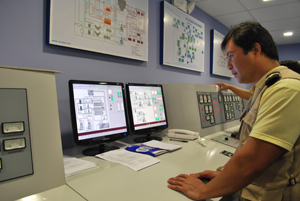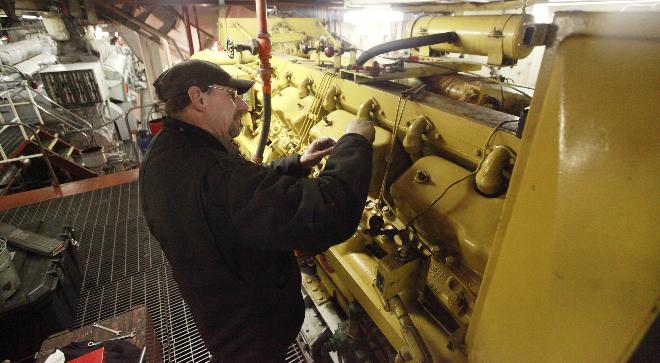One of the most important requirements a ship engineer has is to know and understand his machinery. Before being completely broken, each machine will have a variety of signs and symptoms showing the types and severity of the error.
Along with the knowledge needed to operate the machinery on the ship, sailors also need to know how to identify and fix problems that may occur in the engine room, here are ten ways to help sailors do that.

1. Unusual sounds: from ancient times, sound is the most prominent factor for sailors to recognize signs of machine failure. If you're a skilled sailor, you'll easily recognize the difference between normal and different sounds even if you're not around. For example, the sound of "hissing" is a leak, a loud knock is that the parts are loose, the sound that sounds like a vibration will indicate a blockage, etc. But now there is no specific guidance on recognize the sound of the device. Sailors only through their own experience to recognize these signs.
2. Strange smell: A clear sign that easily detects failures with human senses is an unusual smell in the system. When you feel a strange smell from the ship engine in the vicinity, it may be due to oil leakage, fire, the effects of high temperatures, ... A burning smell near the engine is a sign of an increase. coil temperature. You can detect the smell of oil even if you can't see it. Similarly, steam leakage will leave a distinct smell. It is only available while working on the train, one can know and understand the different odors indicating a variety of problems from machines.
3. Abnormal vibration: All mechanical systems with moving parts create vibrations. One of the most important maintenance tasks for ship machinery is vibration analysis. Many shipping companies do not have planned maintenance systems, even checking in time to tighten the bolts for machinery. All machines have their own vibration frequency. It is important to keep vibration stable, any vibration changes, which, if ignored, can lead to serious damage in the long run. Vibration of a machine can easily be felt right on the ship. This is a sign that should never be ignored.
4. Leakage: leakage is the result of defective pipes or machinery. This is easy to identify on the ship. Never ignore leaks from any type of machine, as it can lead to spills, fires and other serious accidents. If you see oil or gas leaks in the machine, try to fix it immediately or make a note to check on the next maintenance schedule depending on its severity.

5. Smoke: Each engine has a combustion chamber, so it can be assessed by checking smoke, what color changes? and how does the smoke discharge density? Smoke exhaust parts of the engine, auxiliary engine, boiler, ... should be monitored regularly. A black smoke indicates an error in the fuel injection system and the combustion process is not correct (lack of air ..) while white smoke indicates water in the fuel.
6. Abnormal parameters: Abnormal parameters are mainly related to machine errors. To check the parameters on the ship, it is possible to compare the parameters noted on the previous day. During a round inspection, any unusual parameters must be investigated and immediate preventive action taken.
7. Alarm: Each alarm indicates a malfunction on a ship, big or small. Pre-installed alarms to identify failures. Therefore, never ignore a small alarm whether related to any kind of machinery. A mist can alarm the oil level in the main or auxiliary motor, even if the other parameters are normal (Crankcase temperature, ...). Many cases of explosion incidents have been alarmed but sailors ignore it.
8. Observe the problem in the connection system: The ship's engine room is where most systems are connected to machines. If you observe a problem, check the other machines connected to it. For example, when a sudden decrease in machine speed is detected, check for any leaks in the main engine, generator, air compressor or any type of machine connected to it. A leak in the engine's fuel storage unit will cause air to enter, the pressure changes during the internal combustion compression, or the fuel is released into the vent or other holes.
9. Variable electric current: More than 80% of the machines on a cargo ship are operating electrically. Ensure a stable current test through electrical operation machines and pumping systems.
10. Knowledge of machine parts: Last but not least, understanding machines from the inside out will help you determine whether the change is very small. Understanding its history, reading maintenance logs and keeping a regular check-up mode will provide you with information about the operation of the device under different conditions. This will be easy for you to recognize any errors in the machine system when it works differently from the normal working model.












.png)


.jpg)
.png)
.jpg)











